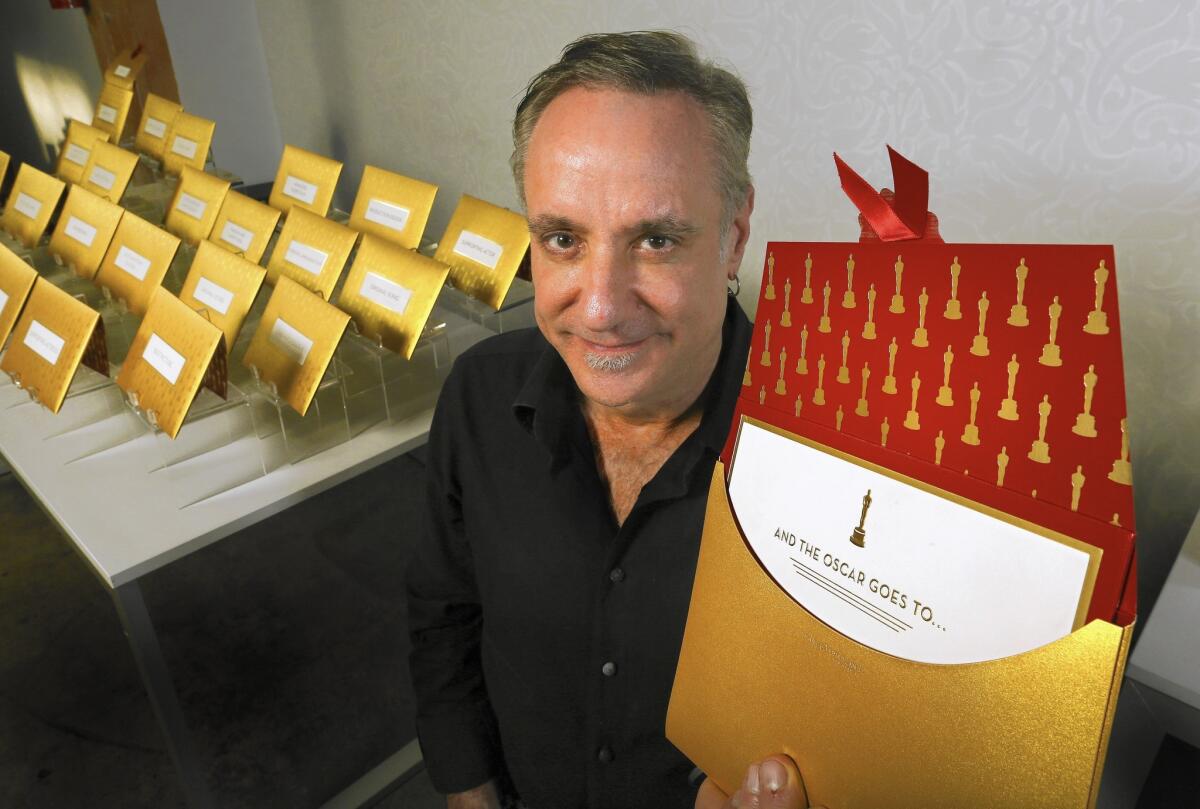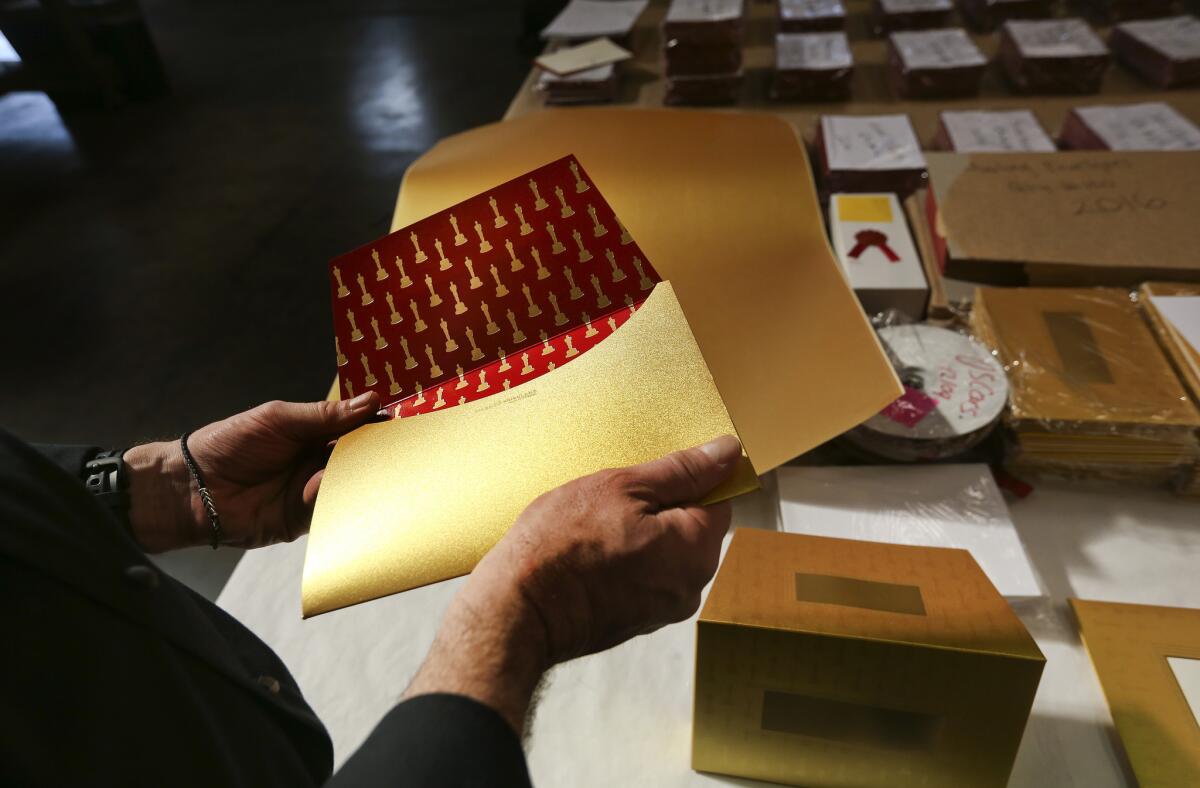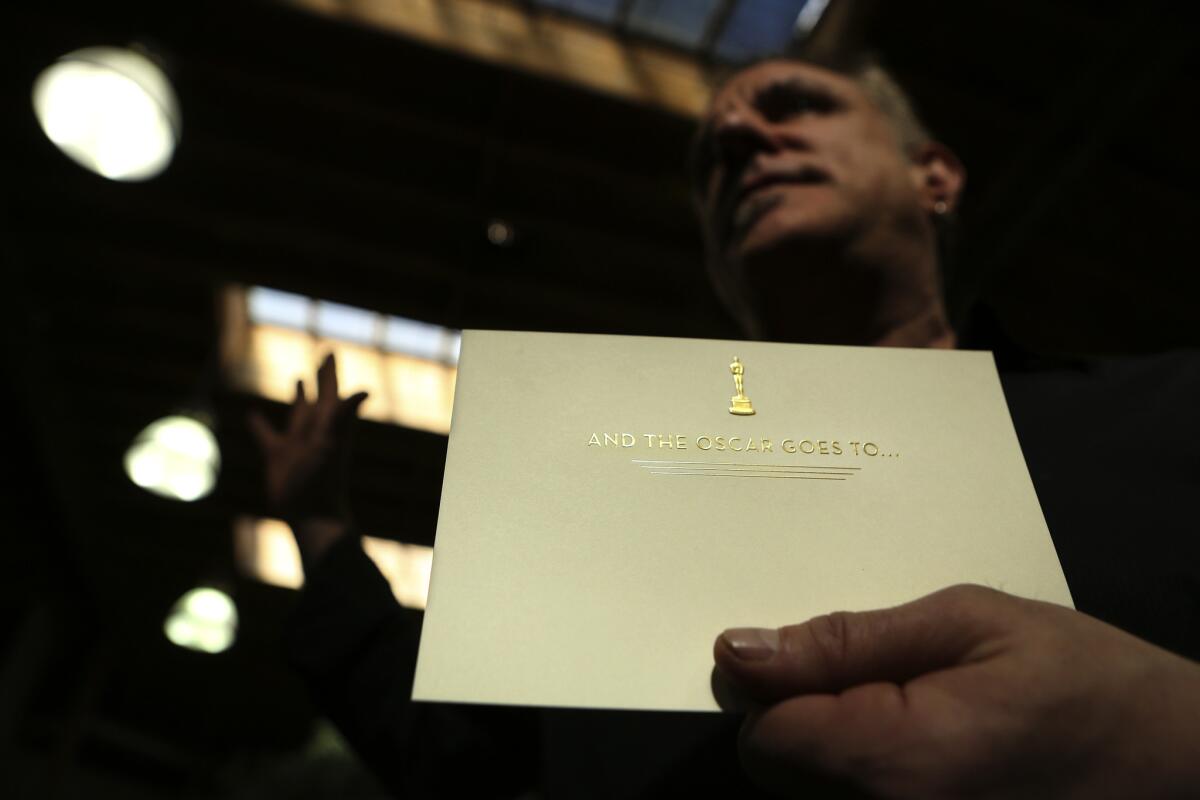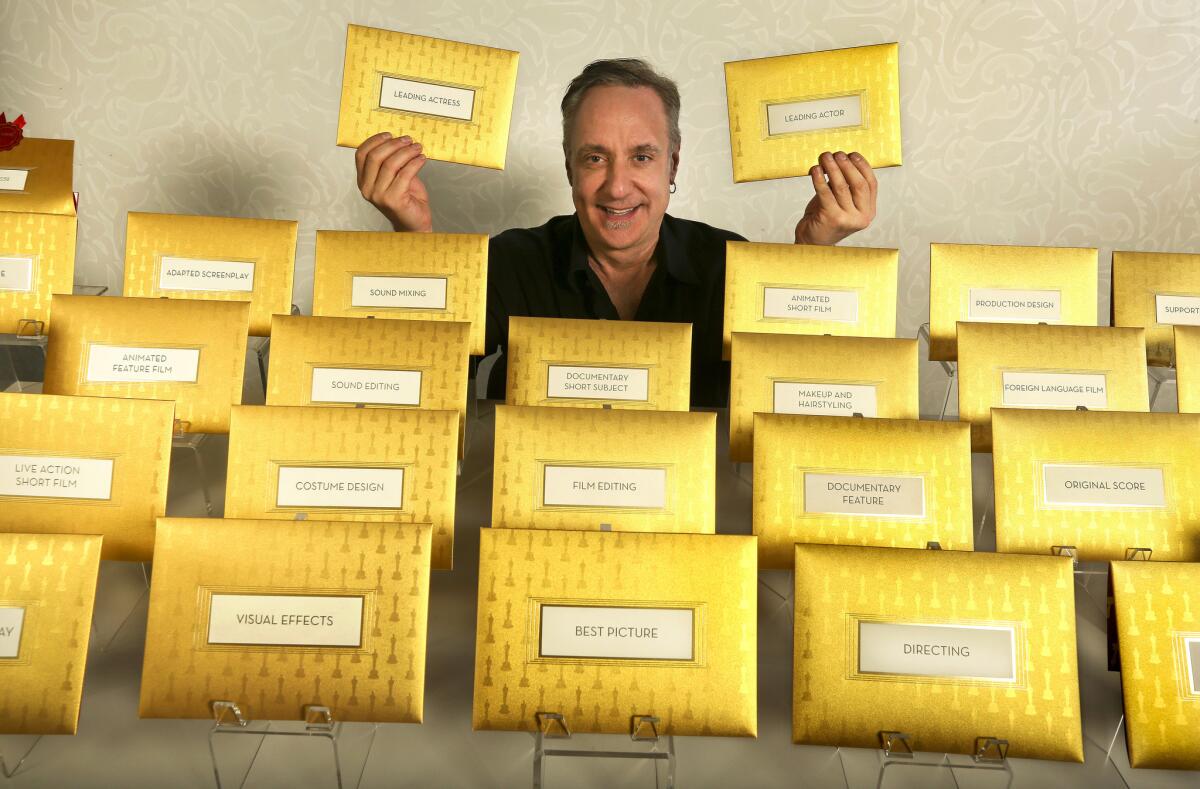Oscars 2016: A closer look at those ritzy award envelopes and their super-secret delivery

- Share via
Marc Friedland thought something was missing from the Academy Awards ceremony. He watched for years as the Oscar statuette was often wordlessly handed to the recipient, a moment that was oddly anticlimactic. Friedland, whose Marc Friedland Couture Communications company has for 30 years designed custom stationery and invitations, noticed how much more fanfare surrounded the opening of the mystery envelope that contained the winner’s name.
Channeling his trademark style and friendly salesmanship, Friedland approached the Academy of Motion Picture Arts and Sciences in 2011 with a plan to turn those ordinary envelopes into extraordinary icons.
“The academy was using nice stationery, but it wasn’t a keepsake. It was nothing to write home about,” he said. “The hardest part was getting someone to understand that this really commemorates that pin-dropping moment of achievement.” He had only to remind them of the ceremony’s two most famous phrases: “The envelope, please” and “The Oscar goes to ….”
OSCARS 2016: Full coverage | Complete list of nominees | #OscarsSoWhite: The boycott, reaction and more | Awkward Oscar moments | Oscars quiz | Awards season database | Top nominee photos | Ballot
Now the historic moment when a nominee transitions to a winner has a thick, shimmering, gold and red lacquer document worthy of the occasion. The 6-by-9-inch set weighs 4 ounces and is adorned with a red seal and satin ribbon. The card looks like a deluxe diploma for a graduate of a Hollywood glamour school.
At his Mid-City studio weeks before the balloting ended, Friedland had readied neat stacks of the Oscar cards and envelopes to be labeled with the 121 nominee names and 24 award categories.

Creative Director Marc Friedland is photographed at his studio in Los Angeles where they make the famous Oscar envelopes for the Academy Awards show each year.
Handcrafted of metallic, matte gold paper, the envelopes are individually die-cut and hand-folded. For beauty and security, the exteriors are engraved with a gold-on-gold, almost holographic repeating image of a tiny Oscar statuette that functions like a watermark. The interiors shine with a vivid red lacquer that is hand-stamped with gold-leaf, repeating imprints of the Oscar statuette.
Sizable labels on the envelope’s front and back flap list the award category in type large enough for a presenter and cameras to read easily.
“The labels are so prominent because of the pressure and the anticipation of 1 billion people watching. We designed this to make it almost 100% foolproof. We want no one to pick up the wrong envelope,” Friedland said.

Marc Friedland holds the card that is placed inside each Oscar envelope.
The ecru nominee cards, mounted on a gold-framed, red-lacquered backing, are engraved with the lead-in script: “And the Oscar goes to ….” The envelope flap is secured with a sticky adhesive seal that’s more forgiving and predictable than sealing wax, which crumbles with age. To ease the card from the envelope, the edges may be waxed.
The nominee cards are made with traditional, turned-edge, bookbinding techniques, which is why they feel like the cover of a weighty hardback.
“Some of the techniques are very old-world,” Friedland said. The textural golden Oscar statuette on the cards is created by a hand-carved die. To capture a feel of Hollywood’s golden age, Friedland created a proprietary typeface inspired by the modern lines of architect Richard Neutra.
As an additional security measure, Friedland creates three sets of nominee cards and transfers 72 unstuffed envelopes and 363 cards to PricewaterhouseCoopers, the accounting firm that has been counting Oscar ballots since the 1935 ceremony. To prevent names of winners from leaking, the academy began using lined, opaque envelopes sealed with wax in 1941.
The vote tabulation and envelope stuffing are conducted with security worthy of a spy caper. The accounting firm divides ballots among teams that count only a portion of each category. Only two PricewaterhouseCoopers partners, Brian Cullinan and Martha Ruiz, know the identities of the Oscar winners before the envelopes are opened live on stage.
“Martha and I know the winners, and we are the only ones to stuff the winning card into the envelope for each of the 24 categories,” said Cullinan, PricewaterhouseCoopers’ lead partner for the academy’s account. The firm will start tabulating votes when the polls close at 5 p.m. Tuesday.

Marc Friedland is photographed at his studio in Los Angeles where they make the famous Oscar envelopes for the Academy Awards show each year.
In an undisclosed location, the partners tabulate votes and stuff two sets of winning envelopes, partly as another security measure and also to aid the show’s flow. Stationed with their signature briefcases on opposite sides of the stage, either Cullinan or Ruiz can dispense envelopes to presenters. At the end of the evening, each accountant will have given out about half of the envelopes.
And the third set? “There is no third ‘set’ sitting somewhere that has the winning cards in the winning envelopes,” Cullinan said. However, the remaining, unstufffed envelopes and nominee cards are shipped to a second secret location, just in case some disaster prevents access to the completed sets. After the ceremony, unused cards and envelopes are destroyed by an industrial document-destruction company.
“We have never ever, ever used that third set. It’s completely as a backup,” Cullinan said.
Armed bodyguards will accompany the accountants, who travel separately to the ceremony, and stay with them until the final envelope has been handed out. As an additional level of security, Ruiz and Cullinan memorize the winners.
“When we seal the envelopes, there is no piece of paper where the winners’ names are written down,” Cullinan said.
“That’s why the printer of the cards doesn’t know who won, ever,” said Cullinan. But Friedland is proud to know this: Those envelopes are now part of Hollywood history.
More to Read
Only good movies
Get the Indie Focus newsletter, Mark Olsen's weekly guide to the world of cinema.
You may occasionally receive promotional content from the Los Angeles Times.










